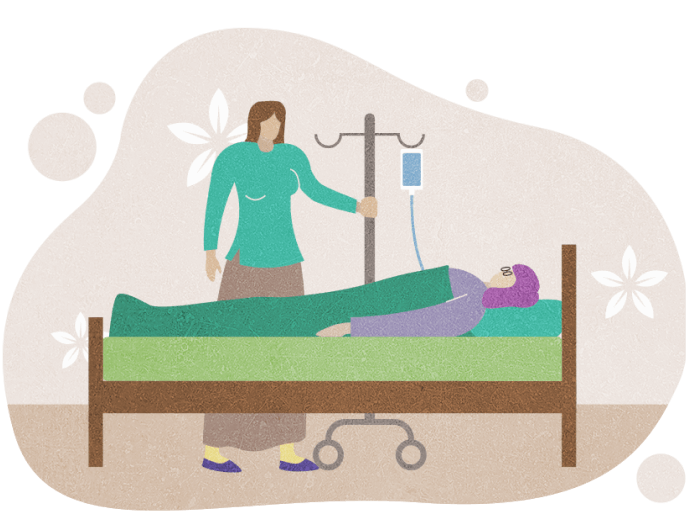End-of-life care

End-of-life care
As someone approaches the end of their life, it is crucial that their physical, emotional, and spiritual needs are met. This is where end-of-life care comes into play, providing comfort and support for those nearing the end of their journey. The person can remain in their familiar surroundings and receive care based on their unique needs and preferences. The goal of end-of-life care is not only to manage symptoms and provide pain relief but also to help people and their families find peace during this difficult time.
What are the benefits of end-of-life care at home?
Compared to a hospice or a care facility there are several advantages to receiving end-of-life care at home. A live-in care worker will make sure that you receive as much peace and comfort as possible, providing care on a one-to-one basis. This ensures immediate, compassionate care, exactly when its needed.

Consistency
With live-in care, you can be confident that all your needs will be met. As your situation develops, your care worker will be able to adapt to meet any additional requirements. Additional services can also be accessed quickly if they are required, such as double handed care for those needing extra support.

Comfort
It’s natural to want to spend our remaining days in the comfort of our own home. Live-in care makes this possible, allowing you to maintain a sense of normality at a difficult time.

Cost effectiveness
There are no hidden or additional costs, ensuring that you receive excellent value for money. As all care is tailored to your unique requirements, you can be sure that you have access to the expert care you require.
Request a free information pack
Call 0208 857 7717 to receive additional information about our services. See why we’re the right team to meet your care needs.
How can end-of-life care provide reassurance?
Respecting the person’s dignity and autonomy
It’s important to prioritise the person’s dignity and autonomy. Everyone deserves to be treated with respect and compassion during this difficult time. With a dedicated care giver who is available 24/7, individuals can receive the one-to-one support they need to maintain their independence and sense of self. Whether it’s assistance with daily activities or simply having someone to talk to, live-in care can provide both practical and emotional support.
Managing emotional and spiritual needs
The end-of-life stage can be an emotional and spiritual journey for both the person and their family. At this time, it is crucial to have care that is not only effective, but also compassionate and considerate of the individual’s needs. That’s why live-in care is becoming more and more popular among individuals and families. A trained professional will put the right care in place to ensure the care recipient is comfortable.
Creating a peaceful, comfortable environment
Being at home can offer a sense of familiarity and comfort during a difficult time, but it’s important to make sure the space is set up properly. This can include adjusting the lighting, temperature, and noise levels to match the person’s preferences, or ensuring that all necessary medical equipment is easily accessible. By working together, we can ensure that the person’s final moments are spent in a space that feels safe, comfortable, and filled with love.
Support from a professional care worker
Pain management
One of the most important aspects of end-of-life care is managing symptoms and pain without compromising quality of life. Care workers can provide a range of services, from medication management to emotional support, to ensure that the client is as comfortable as possible. With the right strategies, clients can focus on living their remaining days with dignity and peace of mind.
Assistance with grief and loss
Family members and care givers experience emotional strain during this stage, making it important to have ongoing support and encouragement. Grief and loss are personal experiences, and everyone handles their emotions differently. However, some coping mechanisms that have been found to be helpful, such as talking to a supportive person, joining a support group, and exercising.
Learn more about us
Caring for others is highly rewarding. Listen to our stories to discover what motivates us. If you have a question you’ll find that we’ve answered the questions we’re asked most often. Find out how our services can make a difference.
Maintaining communication with the person’s medical team
As a person’s care needs become more and more complex, collaborating with a wider medical team becomes essential. Working alongside other healthcare professionals ensures that every requirement is met. This provides all the parties involved with the peace of mind that nothing is being overlooked. Having the support of a wider team is the ideal way to ensure continuity of care and can aid in decreasing stress levels and anxiety related to the end-of-life transition.
How to choose the right end-of-life care worker
Making decisions about end-of-life care for a loved one can be difficult. A live-in care worker can offer assistance with daily activities, such as bathing and dressing, as well as emotional support during this challenging time. When choosing a care worker, it is important to ensure they have the experience, certifications, and availability to meet the person’s needs effectively. Of course, it’s also vital that their personality is a match for your loved one, allowing them to connect with them and provide reassurance.
Speak to our team
The end-of-life stage is a challenging time for everyone involved. For additional support, rely on our team of live-in care workers. Call 0208 857 7717 to discuss your requirements through a friendly, informal chat.
